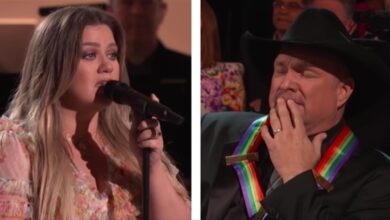Feel the Heartache in Dwight Yoakam’s “I Sang Dixie,” A Truly Sorrowful Country Classic
Dwight Yoakam, a luminary in the world of country music, carved his niche in the genre with a distinctive style that blends elements of traditional country with rockabilly influences. Born on October 23, 1966, in Pikeville, Kentucky, and raised in Columbus, Ohio, Yoakam often drew inspiration from the music surrounding him in his formative years. His appreciation for classic country artists like Buck Owens, Patti Page, and Merle Haggard would later influence his own songwriting and performance.
Yoakam’s artistic journey began when he moved to Los Angeles in the early 1980s, where he found a burgeoning audience for his sound. He released his debut album, *Guitars, Cadillacs, Etc., Etc.*, in 1986, which showcased his blend of contemporary country vibrancy and traditional roots. The album was well-received, particularly the title track, which set the stage for his subsequent success. His unique voice—characterized by a blend of heartfelt emotion and a distinctive twang—quickly captured the attention of both critics and fans.
The release of *Hillbilly Deluxe* in 1988 marked a pivotal moment in Yoakam’s career. This album featured “I Sang Dixie,” a song that resonated deeply with listeners, illuminating themes of nostalgia and personal reflection. The lyrics transcend mere narrative, and instead, they evoke a collective memory that many listeners can relate to. Yoakam’s storytelling ability shines through as he captures the essence of longing for home, a sentiment familiar to anyone who has ventured far from their roots.
Musically, “I Sang Dixie” is rich with traditional country instrumentation, prominently featuring the steel guitar, which adds a layer of authenticity to the sound. Yoakam’s ability to interlace these traditional sounds with modern country styles reflects a broader trend in the genre—one that respects its heritage while allowing for innovation and evolution. The song’s arrangement cleverly combines rhythmic elements that propel the narrative forward, inviting listeners into his evocative world.
The emotional depth of “I Sang Dixie” is supported by Yoakam’s remarkable vocal delivery. His expressive performance conveys the weight of the lyrics, drawing listeners into the story and evoking their own memories of home and the passage of time. This level of engagement demonstrates Yoakam’s skill not only as a songwriter but also as an interpreter of his work. His concerts often highlight this connection, as he builds a rapport with audiences that amplifies the emotional resonance of his music.
Over the decades, Dwight Yoakam’s contributions to country music have been significant. He’s received numerous accolades, including Grammy Awards and nominations, which speak to his influence and the quality of his work. Beyond his musical endeavors, Yoakam has also ventured into acting, showcasing his versatility as an entertainer. He has appeared in films such as *Sling Blade* and *Panic Room*, demonstrating that his talents extend far beyond the music stage.
“I Sang Dixie” has not only enjoyed lasting popularity but has also been embraced by other artists who recognize its significance within the country music canon. Its themes of nostalgia and identity resonate with a wide array of musicians and songwriters, further cementing its place in the cultural landscape. Cover versions and tributes pay homage to Yoakam’s original, thereby ensuring its continuity in the soundscape of modern country music.
As country music continues to evolve, Yoakam’s influence is evident in the work of younger artists who embrace a blend of traditional and contemporary sounds. His willingness to explore different musical avenues while remaining true to his roots is a lesson for many. The stories told in his music, especially in songs like “I Sang Dixie,” encourage a deeper exploration of personal and collective histories, reminding listeners of the power of narrative in song.
Moreover, the song serves as a cultural touchstone, often bringing audiences together as they share in the emotional experience it invokes. The interplay between the personal and the universal is one of the elements that make country music profoundly relatable. Yoakam’s ability to tap into this connection cements his status as a key figure in the genre’s story, one that continuously unfolds through the music he creates.
In summary, “I Sang Dixie” is not just a poignant song that captures the essence of longing for home; it is a representation of Dwight Yoakam’s artistry and the broader themes of country music. Through his mixed influences and authentic storytelling, Yoakam has made significant contributions to the fabric of the genre, paving the way for future generations while continuing to connect deeply with fans old and new alike. The song’s enduring appeal is a testament to his remarkable ability to evoke powerful emotions through music, creating a lasting legacy that will resonate for years to come.





